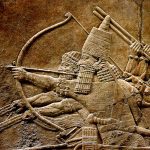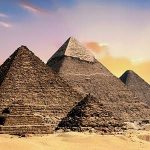Isaiah 10
Read the Text
KJV
King James Version
NRSV
New Revised Standard Version
NIV
New International Version
LEB
Lexham English Bible
HEB
Hebrew Bible
ASV
American Standard Version
NET
New English Translation
Summary
The destruction of Assyria is a symbol of the destruction of the wicked during the Second Coming. Israel will be gathered in that day.
| KJV | JST |
| (7) Howbeit he meaneth not so, neither doth his heart think so; but it is in his heart to destroy and cut off nations not a few. | (7) Howbeit he meaneth not so, neither doth his heart think so; but |
| (10) As my hand hath found the kingdoms of the idols, and whose graven images did excel them of Jerusalem and of Samaria; | (10) As my hand hath founded the kingdoms of the idols, and whose graven images did excel them of Jerusalem and of Samaria; |
| (11) Shall I not, as I have done unto Samaria and her idols, so do to Jerusalem and her idols? | (11) Shall I not, as I have done unto Samaria and her idols, so do to Jerusalem and to her idols? |
| (12) Wherefore it shall come to pass, that when the Lord hath performed his whole work upon mount Zion and on Jerusalem, I will punish the fruit of the stout heart of the king of Assyria, and the glory of his high looks. | (12) Wherefore it shall come to pass when the Lord hath performed upon mount Zion and upon Jerusalem, I will punish the fruit of the stout heart of the king of Assyria, and the glory of his high looks. |
| (13) For he saith, By the strength of my hand I have done it, and by my wisdom; for I am prudent: and I have removed the bounds of the people, and have robbed their treasures, and I have put down the inhabitants like a valiant man: | (13) For he saith, By the strength of my hand and by my wisdom I have done these things, for I am prudent. And I have moved the borders of the people, and have robbed their treasures, and I have put down the inhabitants like a valiant man: |
| (15) Shall the axe boast itself against him that heweth therewith? or shall the saw magnify itself against him that shaketh it? as if the rod should shake itself against them that lift it up, or as if the staff should lift up itself, as if it were no wood. | (15) Shall the ax boast itself against him that heweth therewith? |
| (21) The remnant shall return, even the remnant of Jacob, unto the mighty God. | (21) The remnant shall return, yea even the remnant of Jacob, unto the mighty God. |
| (23) For the Lord God of hosts shall make a consumption, even determined, in the midst of all the land. | (23) For the Lord God of hosts shall make a consumption, even determined, in |
Commentary
Bible Central Commentary
These free resources were developed for use in the free ScripturePlus app. Many of the contributors are professors of religion and ancient scripture at Brigham Young University.
Historical Commentaries
Many of the commentaries below are in the public domain and were authored over 100 years ago. In many cases, they do not reflect the findings of modern scholarship, but they may be helpful for understanding the history of biblical scholarship.
Videos
Watch selected videos on this chapter of the Bible to enhance your study. Note: Not all videos included come from a Latter-day Saint perspective. Inclusion on this list should not imply endorsement for all content.
Overview: Isaiah 1-39
BibleProject
Historical Settings
Time
*All Dates Are Approximate, according to the narrative of the Bible. These dates may reflect literary significance as opposed to the precise dates of history.
See Biblical ChronologyFurther Reading
Book of Mormon Central, “Why Does Isaiah Prophesy of the Daughter of Zion? (2 Nephi 13:16–17),” KnoWhy 550 (February 18, 2020).
Donald W. Parry and Janet L. Garrand Willis, “Notes on Vocabulary in Isaiah 2-11, 13-14, 29, 48-54,” in Isaiah in the Book of Mormon, ed. Donald W. Parry and John W. Welch (Provo, UT: Foundation for Ancient Research and Mormon Studies, 1998), 409–422.
David Rolph Seely, “Nephi’s Use of Isaiah 2-14 in 2 Nephi 12-30,” in Isaiah in the Book of Mormon, ed. Donald W. Parry and John W. Welch (Provo, UT: Foundation for Ancient Research and Mormon Studies, 1998), 151–169.








Complete Commentary on the Whole Bible
Matthew Henry (1706)
Commentary on the Bible
Adam Clarke (1831)
Expository Notes of Dr. Thomas Constable
Thomas Constable
Rashi’s Commentary
Rashi (Shlomo Yitzchaki)
Notes on the Bible
Albert Barnes (1834)
Exposition of the Entire Bible
John Gill (1746–63)
Biblical Commentary on the Old Testament
Carl Friedrich Keil and Franz Delitzsch (1857–78)
Explanatory Notes on the Whole Bible
John Wesley (1754–65)